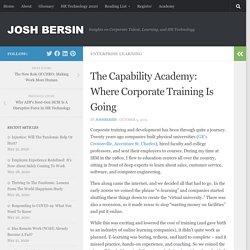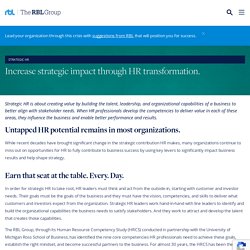

11 HR tech trends to watch in 2020. The 2010s are over, and what a decade it’s been for HR tech.

From flexible working to the rise of the gig economy, a wave of tech solutions have sped up and automated HR processes. This has allowed us to manage people like never before. Now we’re entering the 2020s, though, what big tech trends can the HR sector expect next? As we did ahead of 2019, and 2018, we’ve asked HR and People experts around the world. 1. The right HR technology doesn’t just automate tasks for employees – it enables them to contribute fully, and leverage their potential as unique individuals, explains Jon Ingham, author of ‘The social organization’.
“Approaches need to move towards liberating and empowering people,” he explains. 2. The time has come to create an ‘organization guidance system’ that can be used by business and HR leaders to provide course-correcting and enable more effective organizations in 2020, says Dave Ulrich, Rensis Likert Professor at the Ross School of Business. The Capability Academy: Where Corporate Training Is Going. Corporate training and development has been through quite a journey.

Twenty years ago companies built physical universities (GE’s Crotonville, Accenture St. Charles), hired faculty and college professors, and sent their employees to courses. During my time at IBM in the 1980s, I flew to education centers all over the country, sitting in front of deep experts to learn about sales, customer service, software, and computer engineering. Then along came the internet, and we decided all that had to go. In the early 2000s we coined the phrase “e-learning” and companies started shutting these things down to create the “virtual university.” While this was exciting and lowered the cost of training (and gave birth to an industry of online learning companies), it didn’t quite work as planned.
The Disruption Of Digital Learning When YouTube, Lynda.com, and MOOCs first started ten years or so ago, they disrupted the e-learning market. We then entered another decade of experimentation. Loraine Kennedy - Learning & Development. What is an HR Business Partner? New Zealand Map - Map of New Zealand. Increase strategic impact through HR transformation. Untapped HR potential remains in most organizations.

While recent decades have brought significant change in the strategic contribution HR makes, many organizations continue to miss out on opportunities for HR to fully contribute to business success by using key levers to significantly impact business results and help shape strategy. Earn that seat at the table. Every. Day. In order for strategic HR to take root, HR leaders must think and act from the outside-in, starting with customer and investor needs. The RBL Group, through its Human Resource Competency Study (HRCS) conducted in partnership with the University of Michigan Ross School of Business, has identified the nine core competencies HR professionals need to achieve these goals, establish the right mindset, and become successful partners to the business.
Empower your HR leaders to drive your organization forward. The success of your organization ultimately hinges on the quality, engagement, and alignment of your people. Digital HR: What Is It and What’s Next? No one doubts that technology has changed our lives.

Global online sales have doubled in five years to over $1.5 trillion. The big six social networks (Facebook, Twitter, LinkedIn, Instagram, Google+, and Pinterest) exceed a total membership of 2.4 billion people. If it constituted a country, Facebook—the most popular social media platform—would be the second most populous country on the planet, after China. Technology pervades our daily lives in how we use computers, communicate, access entertainment, drive, shop, form relationships, and so forth. Unprecedented and fast innovation in technology provides digital information that increases and enables customization, underpins predictive analytics, and redefines boundaries.
So, what are the implications for HR? Human resources is not exempt from being affected by this digital progression. Phase 1: Efficiency: To what extent do we use technology to streamline administrative HR work? Welcome to brighter. Mercer Global HR Conferences.